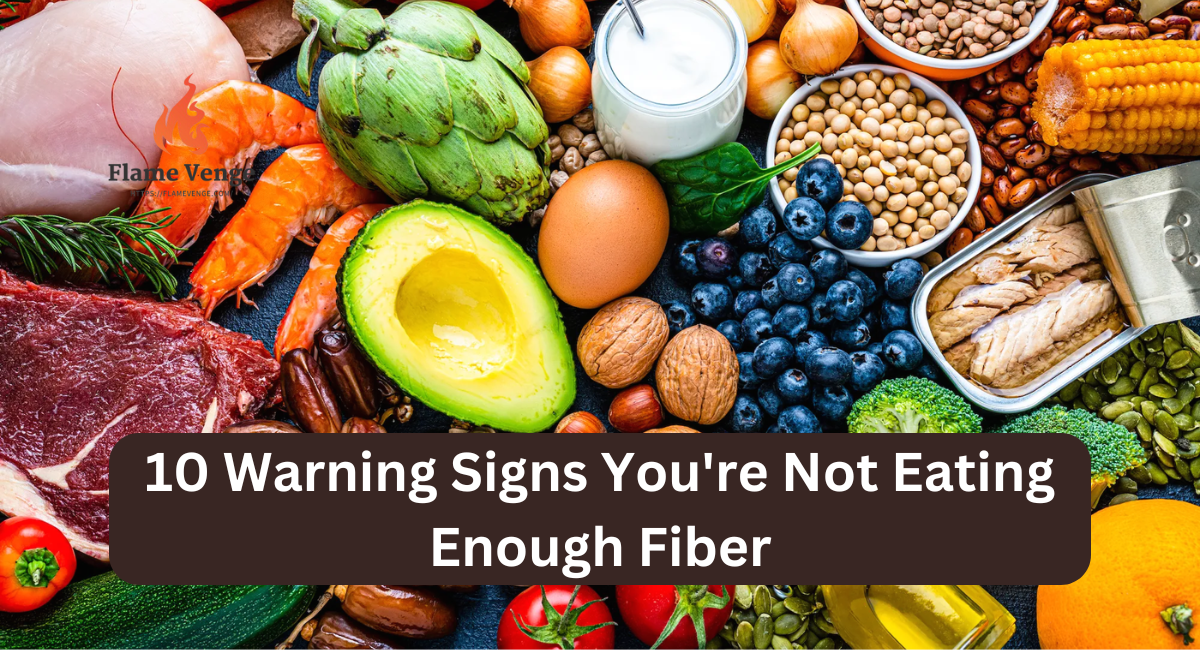Fiber is important for a healthy digestive system, weight management, and disease prevention, making it an essential component of a healthy diet. However, many people lack enough fiber, leading to various health issues. This article explores ten warning signs that indicate a fiber deficiency, such as constipation, weight gain, and high cholesterol levels. Noticing these signs and eating more fiber can make you healthier and feel better overall.
1. Constipation:
Constipation is one of the most common and immediate symptoms of insufficient fiber. Fiber, for example, insoluble fiber, makes crap heavier and assists it with rushing through the stomach-related framework. Not having sufficient fiber can make crap challenging to pass, prompting less defecations and uneasiness. Diverticulosis and hemorrhoids are two additional complications that can arise from chronic constipation.
2. Weight Gain:
Fiber is essential for managing weight. Foods with a lot of fiber make you feel full longer after eating, which can help prevent overeating. Soluble fiber, in particular, slows down the digestion of food and the absorption of sugars. It can assistance you control your blood sugar and lose weight. Without enough fiber, you may find yourself feeling hungrier more often and consuming more calories than your body needs.
3. High Cholesterol Levels:
Eating oats, beans, and flaxseeds can help lower cholesterol. These foods contain soluble fiber, which binds to cholesterol in the body and aids in its elimination. This can reduce LDL (bad) cholesterol levels and lower your risk of heart issues like heart attacks and strokes.
4. Blood Sugar Spikes:
Fiber, particularly soluble fiber, helps to slow down how quickly sugar enters your blood, which can prevent blood sugar from rising quickly. When your diet lacks fiber, the rapid absorption of sugars can lead to sharp increases in blood glucose levels. This can be a big problem for people with diabetes or insulin resistance because it can make it tougher to control blood sugar levels.
5. Feeling Hungry Shortly After Eating:
Foods with lots of fiber take longer to chew and digest, so you feel full longer. This satiety effect helps regulate appetite and can prevent overeating. If you’re not consuming enough fiber, you might feel hungry soon after meals, leading to more frequent snacking and potentially contributing to weight gain and other metabolic issues.
6. Low Energy Levels:
Fiber helps keep your energy levels steady by slowly releasing sugar into your blood. Not having enough fiber can change your blood sugar levels quickly, making you feel tired, slow, and unfocused during the day.
7. Digestive Disorders:
Not getting enough fiber can make stomach problems worse. Fiber helps feed the good gums in your stomach, which are essential for keeping your stomach healthy. If you don’t eat enough fiber, it can mess up the balance of these bacteria and cause problems like IBS, bloating, and other stomach issues.
8. Hemorrhoids:
Hemorrhoids are swollen blood vessels in the lowest part of the rectum and anus, often caused by pushing too hard when going to the bathroom. They can become hard without adequate easier, making them easier to pass and leading to straining. This makes it more likely to get hemorrhoids, which can hurt and make you bleed when you poop.
9. Increased Risk of Colon Cancer:
Long-term fiber deficiency has been associated with an increased risk of developing colorectal cancer. Fiber helps keep your stomach healthy by ensuring you go to the bathroom regularly and getting rid of harmful substances in your colon. Low fiber intake may result in prolonged exposure to these toxic substances, increasing the risk of cancer development.
10. Poor Skin Health:
Fiber helps remove bad stuff from your body. Not enough fiber can cause waste and lousy stuff to build up and show in your skin. Conditions like acne, dull skin, and other skin issues can be exacerbated by inadequate fiber intake. Additionally, fiber-rich foods often contain essential nutrients and antioxidants that support overall skin health.
Incorporating More Fiber into Your Diet:
Consider incorporating various fiber-rich foods into your diet to address these warning signs and ensure you’re getting enough fiber. Here are some tips:
1. Eat More Fruits and Vegetables:
Fruits and vegetables are high in fiber. Try to eat different colors and kinds of fruits and vegetables in your meals. For example, apples, oranges, carrots, and broccoli are all high in fiber and provide additional vitamins and minerals.
2. Choose Whole Grains:
Instead of refined grains, choose whole grains like brown rice, quinoa, barley, and whole wheat. Whole grains are higher in fiber and retain more of the essential nutrients that are destroyed during processing.
3. Incorporate Legumes:
Beans, lentils, and peas are nutritious sources of fiber that can be included in meals, soups, and salads. They also contain protein, which is suitable for people who don’t eat meat.
4. Snack on Nuts and Seeds:
Nuts and seeds like almonds, chia seeds, and flaxseeds have a lot of fiber and healthy fats. To increase fiber intake, they can be added to yogurt or oatmeal or eaten as a snack.
5. Read Nutrition Labels:
When you purchase packaged foods, look at the nutrition labels to pick items with more fiber. Choose breads, cereals, and other products with whole grains listed first and at least 3 grams of fiber per serving.
6. Drink Plenty of Water:
Fiber works best when it absorbs water, which helps it to move through the digestive system. Ensure you’re drinking enough water throughout the day to support the fiber in your diet.
7. Increase Fiber Gradually:
You might feel bloated and gassy if you start eating more fiber quickly. It’s better to slowly add fiber so your body can get used to it. Adding fiber slowly over several weeks can help minimize these side effects.
Conclusion:
Recognizing the signs of fiber deficiency and making dietary changes to include more fiber-rich foods can significantly improve your overall health. Fiber plays an indispensable role in maintaining digestive health and managing weight, preventing chronic diseases, and promoting better skin health. Eating more fruits, vegetables, whole grains, beans, nuts, and seeds ensures you get enough fiber and enjoy all the good things it does for your body.
READ ALSO:
Broccoli Is Good for You, So Prepare One of These Recipes for Dinner Tonight

